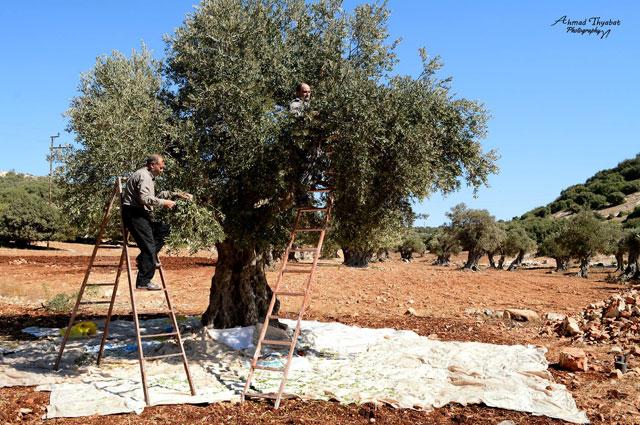You are here
Ministry plays down impact of olive exports as syndicate urges ban
By Omar Obeidat - Oct 16,2016 - Last updated at Oct 16,2016

This October 12 photo shows Abu Mohammad tending to an olive tree in his farm in the northern district of Koura (Photo courtesy of Ahmad Thyabat)
AMMAN – Jordan Olive Products Exporters Association (JOPEA) on Sunday called on authorities to ban exports of olive fruit due to an expected 30 per cent drop in local production this year, a figure the Agriculture Ministry challenged.
JOPEA Chairman Fayyad Zyoud was quoted in a statement by the syndicate as saying that the local production of this year would not be enough to cover domestic consumption, adding that a ban on exports would stabilise the prices of olive oil.
JOPEA board member Musa Saket said the ban on exports would support the olive oil industry in the Kingdom, seconding the call made by Zyoud.
But the ministry’s spokesperson, Nimer Haddadin, said the ministry cannot ban the exports of olive fruit as the government’s strategy is based on encouraging local products to penetrate international markets, adding that exports are the farmers’ business, not the ministry’s.
Haddadin told The Jordan Times that exports of olive fruit do not exceed 1 per cent of local production, challenging JOPEA forecast of a drop in production by almost a third this season.
He said that this year’s produce is expected to see a decline of 10 per cent only, explaining that overseas sales of the fruit usually come from olive trees grown in the desert, where the percentage of oil in such fruit is low, compared to trees planted in mountainous areas.
Imports
In light of decline, would the ministry allow imports of olive oil this year?
“We have been banning imports for several years and it will continue this year because even as local production is expected to decrease, it would still be enough to cover domestic consumption,” he explained.
“Initial figures indicate that 180,000 tonnes of olives were picked during this season, while 26,000 tonnes of olive oil will be produced and 36,000 tonnes of olives will be pickled. The figures are 10 per cent lower than recorded last year,” Haddadin said in previous remarks to The Jordan Times.
In 2015, a total of 200,000 tonnes of olives were picked, 29,000 tonnes of olive oil was produced and 44,000 tonnes of olive fruit were pickled.
Due to the lower production this year, stakeholders expect a rise in olive oil prices, speculating that the 16-litre olive oil container will sell for JD80-90.
Jordan’s overall annual consumption of olive oil stands at about 21,773 tonnes, according to the ministry, which estimates that the average per capita consumption of olive oil in Jordan stands at about 3.43 kilogrammes per year.
Harvesting started
Several farmers across the country have started harvesting their olive trees, though Haddadin said it is advisable to delay the process until the end of October at the earliest.
The ministry allows pressers to open on October 10 of every year, he said, adding that there is no problem in harvesting olives grown near the Jordan Valley at this time of the year.
“We leave it up to farmers to decide when to start harvesting because they are experienced enough to make the right decision,” he added.
Related Articles
AMMAN — Olive trees are expected to bear heavier crop this year, with harvest expected to increase by 40 per cent compared with 2016, accord
AMMAN — The olive harvest is expected to drop by 10 per cent this year due to weather conditions, the Ministry of Agriculture said on Wednes
AMMAN — The Agriculture Ministry will continue banning the import of olive oil to support local production and farmers, Agriculture Minister
















